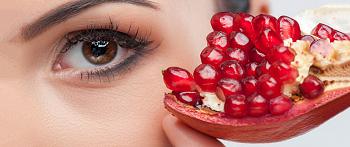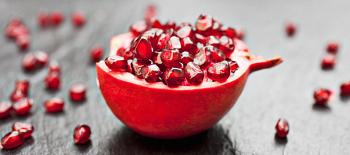Pomegranate: New Discovery Filling The Vestibule Of Aging
A recent study has reported Pomegranates have shown to motivate cells to recycle and rebuild themselves. Researchers in Switzerland have researched and isolated a molecule – urolithin A, which helps in eating away the decayed or damaged or aged parts of the cell, allowing room for rebuilding. Scientists have called this process as mitophagy.
The fruit which was previously believed to be the food of the gods has proven to be actually the fruit of the youthful ageing.
The study published in the journal Nature Medicine, pioneered on mitochondria which are the powerhouses of the cell and play a vital role in turning food into energy. Over the time, mitochondria become worn out and damaged, mitophagy becomes less proficient and cells end up muddled with old and functionally incompetent mitochondria. This harms the health of many organs and tissues, weakens muscles and causes many by products to accumulate causing aging. The upsurge of dysfunctional mitochondria is connected with many conditions of ageing, such as Parkinson's disease, arthritis, etc.
Head researcher Professor Johan Auwerx, from the Ecole Polytechnique Federale de Lausanne in Switzerland said, "We believe this research is a milestone in current anti-ageing efforts, and illustrates the opportunity of rigorously tested nutritional bioactive agents that we consider to have outstanding potential for human health."
However there is a catch. Humans can only benefit from this anti-ageing chemical if they have the right kind of bacteria in their gut. The microbes are needed to convert the fruit's raw ingredient into urolithin A.
Researchers investigated that the molecule increased their 8-10 day lifespan by more than 45 % when fed to nematodes.
A multitude of other health proceeds such as increased energy, cleansing of gut and promoting overall health has already been linked to pomegranates with varying measures of substantiation. The fruit is loaded with antioxidants and is said to decrease the risk of heart disease, help in combating inflammation, improving memory, boosting exercise accomplishment as well as fighting prostate cancer.
Amazentis, a new start up company developed by the scientists exploits the discovery and is on the stage of making initial clinical trials in a number of European hospitals, testing precise titrated doses of the molecule in humans.
Reference: Dongryeol Ryu, Laurent Mouchiroud, Pénélope A Andreux, Elena Katsyuba, Norman Moullan, Amandine A Nicolet-dit-Félix, Evan G Williams, Pooja Jha, Giuseppe Lo Sasso, Damien Huzard, Patrick Aebischer, Carmen Sandi, Chris Rinsch, Johan Auwerx. Urolithin A induces mitophagy and prolongs lifespan in C. elegans and increases muscle function in rodents. Nature Medicine, July 2016 DOI: 10.1038/nm.4132
Comments
There are 0 comments on this post

















